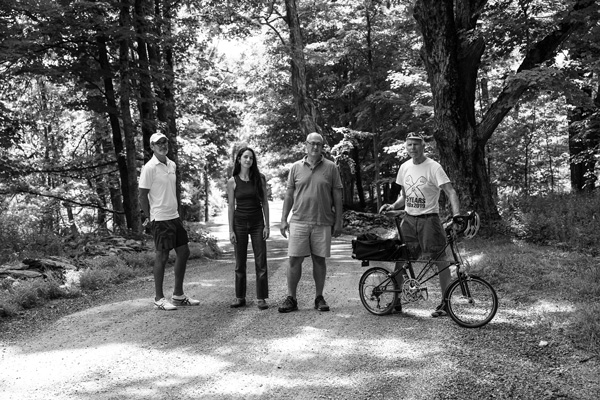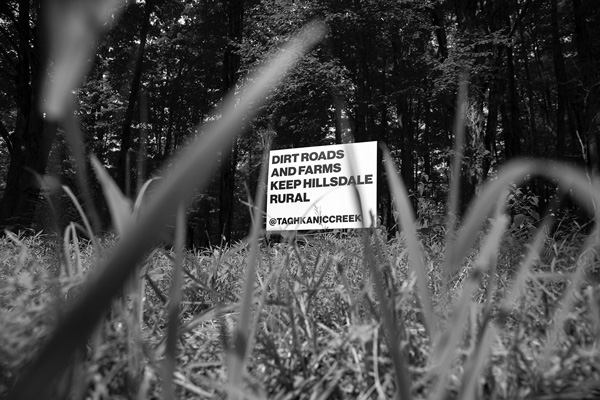News & Issues August-September 2025
The divide over dirt roads
Columbia County paving projects meet resistance from homeowners

Texas Hill Road residents Peter Cohen, Leandra Solovay and Miles Flamenbaum and area bicyclist Steven Klein have opposed the town of Hillsdale’s plans to pave the road. Scott Langley photo
By JOHN TOWNES
Contributing writer
HILLSDALE, N.Y.
One day soon, Texas Hill Road might not be a dirt road anymore.
After months of controversy, officials in the Columbia County town of Hillsdale have opted to go ahead with plans to pave the rural road – over the objections of most of the people who live along it.
The road’s defenders went so far as to offer the town a gift of nearly $20,000 to help cover the cost of maintaining it as a gravel road. But the Town Board in mid-July rejected that offer in a 4-0 vote, with one member abstaining.
The dispute is among several that have emerged around the region in recent years between rural homeowners and municipal officials over road paving. Local highway officials generally say paved roads are less costly to maintain, are safer for cars and provide better access for emergency vehicles.
But those in favor of preserving dirt roads say they’re an important part of the region’s rural character. They contend paved roads invite higher speeds and more traffic, posing a safety hazard to people out walking, running or bicycling. And they say pavement speeds the runoff of pollutants into the local watershed.
The dispute in Hillsdale started around the beginning of the year after the town announced a plan to resurface two roads in the southwestern corner of town, north of the hamlet of Craryville, using a process known as chip sealing.
Chip seal is a type of pavement made up of small rocks or gravel held together by a binder such as asphalt or tar. It’s often used on rural roads as a less costly alternative to standard asphalt pavement.
The town said it would pay for the work on Texas Hill Road and Appletree Lane using funds from a grant of more than $400,000 from the state Consolidated Local Street and Highway Improvement Program.
Apple Tree Lane is a short road that runs through Honey Dog Farm, an organic farm on Rodman Road. Texas Hill Road extends 2.1 miles, connecting West End Road and Lockwood Road, and has about 15 homes along it.
Miles Flamenbaum, who lives on Texas Hill Road, said the town’s paving plans caught homeowners there by surprise.
“It came all of a sudden, and word spread quickly,” he recalled.
Nearly everyone along the road would prefer that it remain unpaved, he said.
“Most of us love the road the way it is,” Flamenbaum said. “It’s part of the bucolic character of the neighborhood, and people enjoy walking along it.”
So he and his neighbors formed an ad-hoc group, the Taghkanic Creek Old Road Society, to push for preserving Texas Hill and other dirt roads. Flamenbaum serves as the group’s president.
Emotional debate
Although the town’s paving plan underwent basic reviews required under Section 284 of state highway law, opponents contend the town failed to engage in good-faith efforts to solicit and fully consider public input. Flamenbaum said town officials were hostile and unresponsive to residents’ requests from the beginning.
“It became emotional and divisive very quickly,” Flamenbaum said. “I still am trying to figure out why. We were trying to be neighborly. We were happy the town got the state money for improvements. We just were suggesting using it for other projects instead of this.”
He acknowledged that while most of those living on Texas Hill Road oppose the paving plan, it’s difficult to gauge the sentiment of the broader public, as townspeople who showed up at public meetings expressed views both pro and con.
Efforts to interview town officials for this article were unsuccessful. Supervisor Mike Dvorchak declined an interview request, saying the town’s decision had been made and that there was nothing more to discuss. Messages left the week of July 20-26 for Highway Superintendent Richard Briggs and other officials were not returned by the end of the month.
But in public meetings and documents from the first half of this year, town officials argued the paving project was needed because of public safety concerns and to avoid the higher expense of maintaining an unpaved road. Because state money would cover the cost of paving, they said, the project effectively would save local taxpayer dollars.
In a letter to the editor published in The Columbia Paper, Briggs said chip sealing has several advantages. He also characterized this form of paving as a “compromise” that he said would retain the overall appearance of traditional dirt and gravel roads while providing a superior surface.
“This makes the road more durable, less dusty, and more skid resistant, resulting in safer roads that need far less maintenance than gravel-dirt ones,” Briggs wrote.
He went on to explain that loose gravel roads need to be regularly regraded, with new gravel applied, especially after winter, while chip-sealed roads only require periodic patching. He estimated that gravel replacement costs taxpayers $25,500 per mile annually in addition to labor and equipment costs.
Briggs also contended that chip sealing is better for the environment. He noted that “all those tons of gravel and dirt don’t just disappear over the winter.” Instead, he said, they wind up in streams and other habitats and interfere with fish spawning and plant life.
Briggs and other town officials also have argued that unpaved roads can cause problems for public safety by hindering the ability of firetrucks, ambulances and other equipment and crews to respond to emergencies.
Flamenbaum and other opponents disagreed with this view, pointing out that Texas Hill Road is not a primary travel route and has very little traffic.
“It’s not a major connection between major roads,” Flamenbaum said. “I work at home and see it from my office window all day. Typically I rarely see more than one vehicle an hour on it.”
He and others also disputed the town’s claims about maintenance costs. He said an analysis by his group of what the town had spent previously found the maintenance cost for Texas Hill Road was considerably lower than the amount the town cited.
Opponents of the paving also argue that chip sealing has negative environmental impacts, such as runoff of the petroleum-based adhesive, and that paving leads to safety issues such as increased and faster car traffic.
Private gifts for public roads?
Spurred by the suggestion that homeowners along the affected roads might be willing to pay to maintain them as dirt roads, town officials set up a Gifting Committee in recent months to review and make recommendations on whether to accept private contributions that could reduce the use of tax dollars on road supplies and maintenance.
Through this process, the town decided in June accepted a proposal from Honey Dog Farm to provide $20,000 to cover gravel and maintenance costs on Apple Tree Lane, preventing that road from being paved.
But when the Taghkanic Creek Old Road Society said it had raised commitments for a similar gift to pay for maintenance of Texas Hill Road, the town refused that offer.
“We’re happy that Honey Dog Farm was able to make that arrangement, but the town handled our proposal differently,” Flamenbaum said. “They had told us to submit a proposal, but they never had a sit-down meeting, and they refused to cooperate or provide us with clear guidance about what was required. The process was very opaque.”
As of late July, Flamenbaum said the group is considering its options, including the possibility of submitting another gift proposal. But he said he was not optimistic the paving of Texas Hill Road could be halted.
Flamenbaum said the conflict seems to have touched on divisions that are larger than the fate of one road.
“Speaking personally, I’d probably have been OK with this result if the process had been more transparent and open to actual review and public input,” he said. “But it also raises larger question of how other situations like this will be handled in the future.”

Preserving a rural tradition
Some communities in the region appear to have taken a more accommodating approach to homeowners who want to keep their roads unpaved. In the nearby town of Chatham, for example, dirt and gravel roads still account for about 47 of the 97 miles of roads the town maintains.
There, a private organization, The Chatham Dirt Road Coalition, works to encourage support for unpaved roads as an element of the town’s heritage and appeal.
Chatham Highway Superintendent James Fetzer said the town does not have an overall policy about preserving or paving dirt roads but handles them on a case-by-case basis. Although there have been occasional controversies over specific roads, in general there is an acceptance and appreciation of dirt roads, he said.
“We seem to like our dirt roads in Chatham,” Fetzer said. “I live on a dirt road myself, and I love it. In my position as superintendent, I’m for having a mix of both paved and unpaved roads, as long as I have the resources to maintain them.”
From a practical standpoint, Fetzer said dirt and gravel roads can be more challenging.
“They do require more time and maintenance for such things as grading and repairing rain damage,” he said. “And when a problem arises on one of these roads, people are quick to call us to fix it right away.”
Overall, he said, most people have been tolerant of differing attitudes about Chatham’s dirt and gravel roads.
“I’d say there’s a mix of people who love them and want to protect them, while others would prefer to see all of our roads paved,” Fetzer said. “And there are many who just accept them as part of the town’s identity. If problems do arise, we encourage everyone to handle their differences respectfully. That generally works out.”
